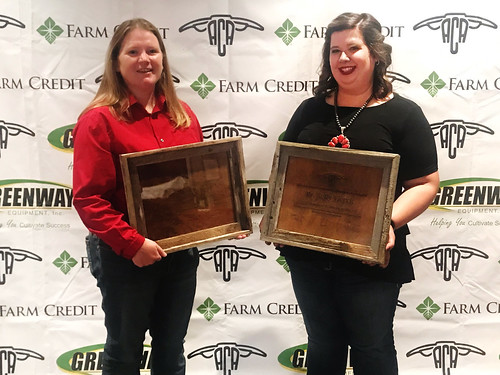Sept. 3, 2021
Arkansas Agricultural Experiment Station meat researchers recognized by Arkansas Cattlemen's Association for education efforts
By John Lovett
U of A System Division of Agriculture
@AgNews479
Fast facts
- Arkansas Agricultural Experiment Station researchers recognized
- Producer Education Awards from Arkansas Cattlemen’s Association
(681 words)
Related PHOTO available at: https://flic.kr/p/2mkSEQj
FAYETTEVILLE, Ark. — Two animal science researchers with the Arkansas Agricultural Experiment Station were recognized by the Arkansas Cattlemen’s Association for their work to educate current and future ranchers on ways to improve meat quality.
The Agricultural Experiment Station is the research arm of the University of Arkansas System Division of Agriculture.
Janeal Yancey and Kelly Vierck were presented with the 2020 and 2021 Producer Education Awards, respectively, by the Arkansas Cattlemen’s Association during the state organization’s convention and trade show in Hot Springs, July 30-31.
Every year the ACA recognizes an individual that has made substantial contributions to cattle producer education in Arkansas. This year they recognized two individuals, one for 2020 and one for 2021, because the 2020 convention was canceled due to COVID-19.
Yancey is a meat scientist with the experiment station’s animal science department. Vierck is an assistant professor of meat science and biology in same department. Both have extensive experience in the field of meat research.
“We have excellent faculty in animal science,” said Michael L. Looper, animal science department head for the Division of Agriculture and the Dale Bumpers College of Agricultural, Food and Life Sciences. “It is always exciting for our stakeholders to recognize our efforts to support animal agriculture in Arkansas. Arkansas ranks 10th in the nation for beef cattle inventory, and we are blessed to have a great relationship with the Arkansas Cattlemen’s Association. Congratulations to both Drs. Vierck and Yancey. Well deserved.”
Looper pointed to Yancey’s work with the Young Cattlemen’s Leadership Class as a contributing factor to the Cattlemen's Association award. The leadership classes are held at the Division of Agriculture’s red meat abattoir.
“Without Dr. Yancey, the ACA’s Young Cattlemen’s Leadership Class (YCLC) would not be what it is today,” said Cody Burkham, executive vice president of the Arkansas Cattlemen's Association. “This is especially true for the fourth session where YCLC participants spend several days at the University of Arkansas learning about the further processing of beef. This class would not be possible within Arkansas without the leadership and knowledge of Dr. Yancey.”
Yancey has studied meats since she was a teenager when she was with a Future Farmers of America meats judging team her freshman year in high school. She went on to earn both her master’s degree and a doctorate in meat science from Kansas State University, following her bachelor’s degree in animal science from Texas Tech University. She is originally from Cross Plains, Texas, about 45 miles southeast of Abilene.
Her educational efforts can also be found in the public realm with her "Mom at the Meat Market Blog," where she shares information on meats for other curious parents. She and her husband Ed, also a meat scientist, have two daughters, Valley and Wyn.
Vierck’s work includes research to examine red meat quality and improve the consumer eating experience. She looks for ways to reduce food waste by extending the shelf life of meat products.
“While Dr. Vierck has only been in Arkansas for a short time, she has worked to further educate producers through attending all nine ACA Area Conferences and presenting information on meat science and processing,” Burkham said. “She has also been awarded numerous grants to further educate producers and future meat processors in the state.”
Originally from Juneau, Wisconsin, Vierck earned her bachelor’s degree in food science from Oklahoma State University, followed by her master’s degree and a doctorate in meat science from Texas Tech University. Her research has focused on investigating marbling texture’s impact on beef palatability. Her doctoral dissertation focused on the postmortem influences on beef flavor development and tenderness. She joined the department of animal science in June 2020 as an assistant professor with a focus on meat science and muscle biology.
Vierck says that through the implementation of hands-on labs and lectures, she wants to bring “cutting-edge research and industry-focused knowledge full circle to develop students into career-ready alumni who are demanded by the meat industry.”
To learn more about the Division of Agriculture research, visit the Arkansas Agricultural Experiment Station website: https://aaes.uada.edu/. Follow us on Twitter at @ArkAgResearch.
About the Division of Agriculture
The University of Arkansas System Division of Agriculture’s mission is to strengthen agriculture, communities, and families by connecting trusted research to the adoption of best practices. Through the Agricultural Experiment Station and the Cooperative Extension Service, the Division of Agriculture conducts research and extension work within the nation’s historic land grant education system.
The Division of Agriculture is one of 20 entities within the University of Arkansas System. It has offices in all 75 counties in Arkansas and faculty on five system campuses.
Pursuant to 7 CFR § 15.3, the University of Arkansas System Division of Agriculture offers all its Extension and Research programs and services (including employment) without regard to race, color, sex, national origin, religion, age, disability, marital or veteran status, genetic information, sexual preference, pregnancy or any other legally protected status, and is an equal opportunity institution.
